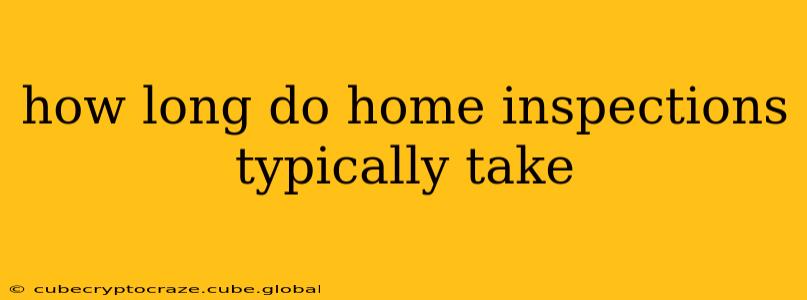Buying a home is a significant investment, and a crucial part of that process is the home inspection. But how long does this vital step actually take? The simple answer is: it depends. However, understanding the factors that influence inspection time will help you manage your expectations and plan accordingly.
Factors Affecting Inspection Time
Several factors contribute to the overall duration of a home inspection. These include:
-
Size of the Property: A larger home with more rooms, features, and systems naturally takes longer to inspect thoroughly. A sprawling ranch will require more time than a small condo.
-
Age and Condition of the Home: Older homes often require more detailed examination due to potential wear and tear, outdated systems, and potential hidden problems. A newer home, in generally good condition, may require less time.
-
Accessibility: Difficult-to-reach areas, such as attics with limited access or crawl spaces requiring significant effort to enter, will add time to the inspection.
-
Complexity of Systems: Homes with intricate plumbing, electrical systems, or HVAC setups will demand a more thorough and time-consuming inspection. The presence of pools, spas, or other outdoor features also extends the process.
What Happens During a Home Inspection?
A typical home inspection involves a comprehensive examination of various aspects of the property. This includes:
-
Exterior: Inspecting the roof, siding, foundation, gutters, downspouts, and landscaping for any damage or potential issues.
-
Interior: Checking the walls, floors, ceilings, windows, doors, and overall structural integrity of the house.
-
Plumbing: Testing faucets, toilets, showers, and inspecting pipes for leaks or corrosion.
-
Electrical: Evaluating electrical panels, wiring, outlets, and light fixtures for safety and functionality.
-
Heating, Ventilation, and Air Conditioning (HVAC): Assessing the functionality and efficiency of the HVAC system.
-
Appliances: A basic check of major appliances like the oven, refrigerator, dishwasher, and washing machine (though this is often not as comprehensive as a dedicated appliance inspection).
How Long Does a Typical Home Inspection Take?
While there's no single definitive answer, a typical home inspection takes between 2 and 4 hours. However, this is just an average. For smaller, simpler homes in good condition, it might be completed in under 2 hours. Conversely, large, older homes with numerous issues might take 5 hours or longer.
What if the Inspection Takes Longer Than Expected?
If your inspector anticipates the inspection will take significantly longer than initially projected, they should communicate this to you. They may need more time to thoroughly assess a particular area or system due to unexpected complexities or concerns. Open communication is key during this process.
What happens after the home inspection?
Following the inspection, you'll receive a detailed report outlining the inspector's findings, including any identified issues or recommended repairs. This report is invaluable in negotiations with the seller or in deciding whether to proceed with the purchase.
Can I be present during the inspection?
While not always mandatory, it's generally recommended that you attend the home inspection. This allows you to ask questions directly to the inspector, clarify any concerns, and gain a better understanding of the property's condition. You can also learn a great deal from observing the inspection process itself.
What if I need a specialized inspection?
Certain aspects of a home might require specialized inspections beyond the scope of a general home inspection. These might include pest inspections, radon testing, or well and septic inspections. These are typically performed separately and add to the overall time commitment.
In conclusion, while the average home inspection lasts between 2 and 4 hours, several factors influence the actual time required. Communicating with your inspector, understanding the complexity of your prospective home, and planning for potential delays are crucial for a smooth and informed home-buying process. Remember, a thorough inspection is a vital investment in protecting your future purchase.
